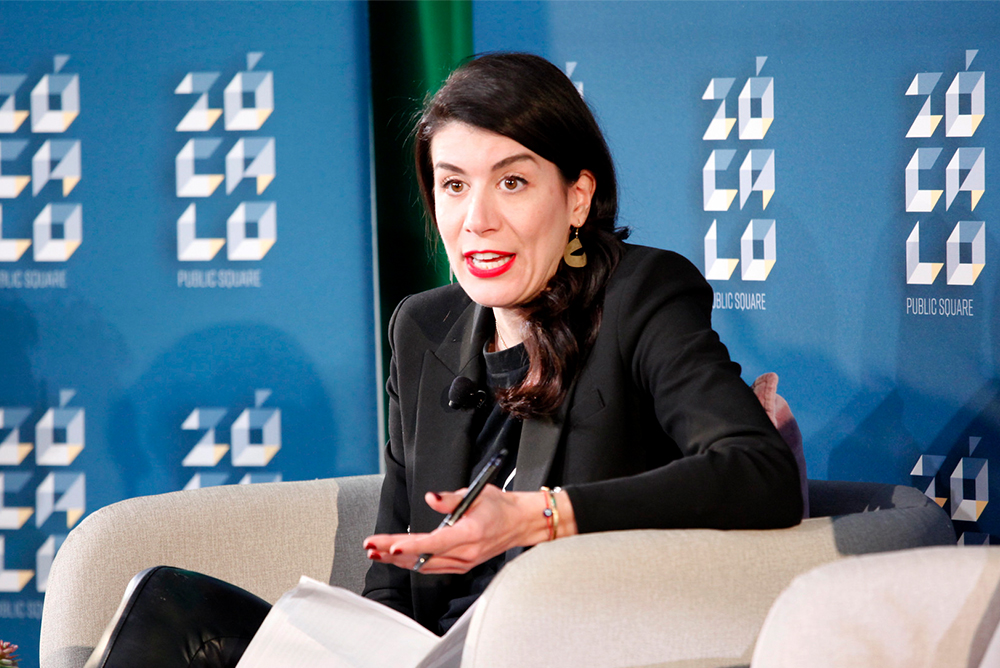
Photo by Aaron Salcido.
Holly Dagres is an Iranian American analyst and commentator on Middle East affairs with a focus on Iran. Currently a senior fellow at the Atlantic Council, she has written for numerous publications, including Foreign Policy, TIME, and the Washington Post. Before joining us as a panelist for “How Can Women and Girls Win in Iran?,” a Zócalo event co-presented with the Goldhirsh Foundation and with generous support from Pedram Salimpour, Dagres joined us in the green room to chat about pop star ambitions, Gen Z activists, and her message to Iranian protestors.
What did you want to be when you were growing up?
I had some phases. When I was a kid, I wanted to be a scientist or doctor. But I had this phase in middle school and high school where I wanted to be a pop singer. And then by the time I was graduating, I thought I was gonna go work at the United Nations—work in international affairs, which is somewhat relevant to what I do now. So I’ve had these phases but yeah, at one time, I aspired to be Britney Spears, I guess you can say.
Was it Britney Spears specifically? Or was there any pop star in particular that you have an image of being or wanting to become?
I don’t think it was specific. But Britney Spears got me through a lot of my first month moving to Tehran just as I was turning 13. “Baby One More Time” had become No. 1, and her album was everything to me at that time. It’s actually a really beautiful story. I just moved and I was going through a lot, you know, it was a big culture shock and my birthday came along and my cousin had gone through heaps and bounds—like all these sorts of complications—to get this original tape of Britney Spears’ debut album. In Iran, Western music is banned, and so I don’t know who he asked to bring this tape for his American cousin to Iran to listen to. I can’t tell you how many times I would have forwarded and rewound that audio tape and memorized that song. It just got me through a lot that first year in Tehran in 1999.
What’s your hidden talent?
I guess I would say singing. Funny story, so again, this was my pop phase. I was visiting Southern California and it was like the big American Idol days. And there was an ad in the newspaper that this singing school was doing like a casting call. They were gonna give scholarships to people. And I was visiting from Iran and my dad was like, oh, I know you like to sing, do you want to go try this? I was like, Sure. So we tried it and by the time we heard back, I was back in Iran, but I got the singing scholarship. And they’re the people that train people to go on American Idol. But my life just went a different direction.
You’ve been reporting on Iran’s Gen Z activists. Is there something that surprised you to learn about this generation of young people?
I was so impressed by their interest and politics and world affairs, and climate change. Like they genuinely care about the world around them. I find myself relating more to Gen Z than I did as a millennial. And I’m not trying to knock on my generation, but we’ve been through so much. We grew up with a global war on terror in the post 9/11 world, and a financial crisis in 2008. I’m so impressed by their ability to be so outspoken, and not be shy to take chances. So if they’re being overworked and underpaid, they’re not shy at all to be like, hey, I’m not doing this anymore, I quit. It’s something that I respect a lot. I have the utmost respect for this generation. And yes, it is generalizing a whole generation, but I’m just very impressed by them. And I really think that they’re going to change the world for the greater good.
What’s a book that’s been on your mind?
I’ve been in this, I would say, female empowerment phase. Being new to Washington, D.C.—I just moved there in April from after living abroad since 2011—I find myself drawn to memoirs of powerful women in Washington. I just read Fiona Hill’s book. It’s great to see powerful, smart women in Washington breaking the glass ceiling in different ways and doing what they’re passionate about. And so, I have been very drawn to these sorts of books these days.
Do you have a message for the women and girls fighting for their rights in Iran right now?
That we hear them, that we hear their voices, and that we will continue to amplify their voices and we won’t forget those that have lost their lives as they fight for freedom.



